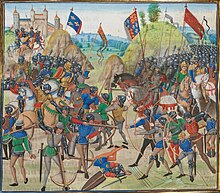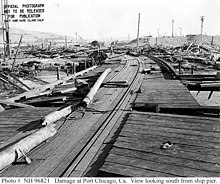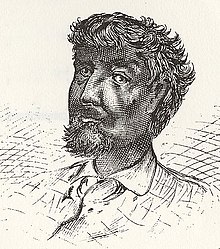Portal:History
The History Portal

Historia by Nikolaos Gyzis
History is the systematic study of the past. As an academic discipline, it analyzes and interprets evidence to construct narratives about what happened and explain why it happened, focusing primarily on the human past. Some theorists categorize history as a social science, while others see it as part of the humanities or consider it a hybrid discipline. Similar debates surround the purpose of history, for example, whether its main aim is theoretical, to uncover the truth, or practical, to learn lessons from the past. In a slightly different sense, the term history refers not to an academic field but to the past itself or to individual texts about the past.
History is a broad discipline encompassing many branches. Some focus on specific time periods, such as ancient history, while others concentrate on particular geographic regions, such as the history of Africa. Thematic categorizations include political history, social history, and economic history. Branches associated with specific research methods are quantitative history, comparative history, and oral history.
Historical research relies on primary and secondary sources to reconstruct past events and validate interpretations. Source criticism is used to evaluate these sources, assessing their authenticity, content, and reliability. Historians integrate the perspectives of several individual sources to develop a coherent narrative. Different schools of thought, such as positivism, the Annales school, Marxism, and postmodernism, have distinct methodological implications.
History emerged as a field of inquiry in the ancient period to replace myth-infused narratives, with influential early traditions originating in Greece, China, and later also in the Islamic world. Historical writing evolved throughout the ages and became increasingly professional, particularly during the 19th century, when a rigorous methodology and various academic institutions were established. History is related to many fields, including historiography, philosophy, education, and politics. (Full article...)
Featured picture
Did you know (auto generated)

- ... that Puerto Rico's Willie Hernández became the highest paid player in Detroit Tigers history after winning Cy Young and Most Valuable Player awards and a World Series?
- ... that with the Green Bay Packers' loss in the 2020 NFC Championship Game, Aaron Rodgers "became the first quarterback in NFL history to lose four straight NFC Championship Games"?
- ... that Group A of the 2006 FIFA World Cup featured the highest-scoring opening game in World Cup history since the competition began using a single match opening format?
- ... that the Harlem Park Three were awarded US$48 million, the largest sum in Baltimore history, after being falsely imprisoned for murder?
- ... that Songs and Flowers of the Wasatch represented a shift in Mormon history toward a "socially-accepted American cultural and religious heritage", according to historian Jennifer Reeder?
- ... that Maggio di Accettura, a festival in Italy dedicated to the Christian martyr Saint Julian, might have pagan origins or be linked to Langobard history?
Jean Baptiste Point du Sable (French pronunciation: [ʒɑ̃ batist pwɛ̃ dy sɑbl]; also spelled Point de Sable, Point au Sable, Point Sable, Pointe DuSable, or Pointe du Sable; before 1750 – August 28, 1818) is regarded as the first permanent non-Native settler of what would later become Chicago, Illinois, and is recognized as the city's founder. The site where he settled near the mouth of the Chicago River around the 1780s is memorialized as a National Historic Landmark, now located in Pioneer Court.
Point du Sable was of African descent, but little else is known of his early life prior to the 1770s. During his career, the areas where he settled and traded around the Great Lakes and in the Illinois Country changed hands several times between France, Britain, Spain and the United States. Described as handsome and well educated, Point du Sable married a Potawatomi Native American woman, Kitihawa, and they had two children. In 1779, during the American Revolutionary War, he was arrested by the British on suspicion of being an American Patriot sympathizer. In the early 1780s he worked for the British lieutenant-governor of Michilimackinac on an estate at what is now St. Clair, Michigan. (Full article...)
On this day
February 3: Lichun begins in East Asia (2025); Feast day of Saint Laurence of Canterbury (Western Christianity); Four Chaplains' Day in the United States
- 1047 – Emperor Henry III declared Drogo of Hauteville to be count of all Apulian and Calabrian Normans.
- 1862 – Moldavia and Wallachia formally united, creating the Romanian United Principalities.
- 1870 – Reconstruction era: The Fifteenth Amendment to the United States Constitution was ratified, formally prohibiting race-based disenfranchisement in the United States.
- 1930 – The Communist Party of Indochina, the Communist Party of Annam and the Communist League of Indochina merged to form the Communist Party of Vietnam.
- 1995 – In mission STS-63, astronaut Eileen Collins (pictured) became the first woman to pilot the Space Shuttle.
- Caroline von Wolzogen (b. 1763)
- Dolly Rudeman (b. 1902)
- Umm Kulthum (d. 1975)
- Mary Healy (d. 2015)
Selected quote
Genius is one percent inspiration, ninety-nine percent perspiration.
— Thomas Edison, scientist and inventor
Related portals
More Did you know...
- ... that in 1898, the United States government annexed the Kingdom of Hawaii despite protestation from Queen Liliuokalani (pictured)?
- ... that Jean Thurel was a soldier in the French Régiment de Touraine for more than 75 years?
- ... that the severed head of Julia Martha Thomas — murdered, boiled and dismembered by her maid in 1879 — was found next door to Sir David Attenborough's house in 2010?
- ... that the 18th-century Indian automaton Tipu's Tiger shows a near life-size European being mauled by a tiger, and emits wails and grunts as well as containing a pipe organ?
- ... that Svið, a traditional Icelandic dish, consists of a sheep's head that has been cut in half, singed, and boiled with the brain removed?
- ... that, despite overseeing the construction of the crematoria and gas chambers at Auschwitz, what specifically shocked SS-Obersturmführer Robert Mulka at the camp was his colleagues' dress sense?
- ... that Tsar Alexander II of Russia had a special crystal bottle of Roederer champagne made for the Three Emperors Dinner in 1867 so that he could admire the bubbles?
- ... that the Gudea cylinders are the longest literary composition ever found in the Sumerian language?
Topics
Categories

History • By period • By region • By topic • By ethnic group • Historiography • Archaeology • Books • Maps • Images • Magazines • Organizations • Fictional • Museums • Pseudohistory • Stubs • Timelines • Chronology • People • Wikipedia historians
WikiProjects
![]() WikiProject History •
Ancient Near East • Australian History • Classical Greece and Rome • Dacia • Former countries • History of Canada • Chinese history • European history • Heraldry and vexillology • Indian history • Jewish history • Medieval Scotland • Mesoamerica • Military history • Middle Ages • History of Science
WikiProject History •
Ancient Near East • Australian History • Classical Greece and Rome • Dacia • Former countries • History of Canada • Chinese history • European history • Heraldry and vexillology • Indian history • Jewish history • Medieval Scotland • Mesoamerica • Military history • Middle Ages • History of Science
WikiProject Time • Days of the Year • Years
WikiProject Biography • Composers • Political figures • Saints • United States Presidents
Things you can do
 |
Here are some tasks awaiting attention:
|
Associated Wikimedia
The following Wikimedia Foundation sister projects provide more on this subject:
-
Commons
Free media repository -
Wikibooks
Free textbooks and manuals -
Wikidata
Free knowledge base -
Wikinews
Free-content news -
Wikiquote
Collection of quotations -
Wikisource
Free-content library -
Wikiversity
Free learning tools -
Wiktionary
Dictionary and thesaurus





















































